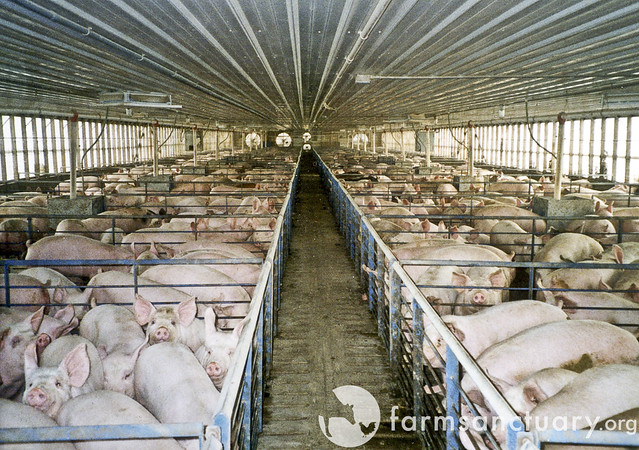If you live in the US, you may have heard about the recent proliferation of regulations in around a dozen states that opponents call “ag-gag laws”. These laws make it illegal to covertly videotape livestock farms or to apply for jobs without disclosing ties to animal welfare organizations.

Image by Farm Sanctuary, via Flickr CC.
Such undercover taping however is often crucial to expose malpractice and inhumane behavior, as this NY Times article points out – in many cases, material produced by groups such as Mercy for Animals has led to investigations and was used directly as evidence in trials covering cruelty against animals.
What are arguments in favor and against these laws?
Proponents include business advocacy groups such as the American Legislative Exchange Council, the American Farm Bureau Federation, and other representatives of agribusiness. They argue the following:
- The public is not used to the practice of animal slaughter, and thus images that may appear bloody and horrible although they actually show best-practice procedures. Kelli Ludlum from the American Farm Bureau Federation compared it to seeing open heart surgery for the first time: it may look like you are slicing up a person, but the procedure is actually saving their life.
- Thus, it is unfair to the industry to use emotional and moral arguments to win over consumers through shocking images. Don Lehe, a Republican state representative from Indiana, was quoted as arguing that animal welfare groups could do unfair harm to farmers and damage their reputation instantly through using online and social media channels: “That property owner is essentially guilty before they had the chance to address the issue.”
- Livestock farmers say that activists try to misconstrue or fabricate documentation, making extraordinary events seem commonplace or railing against practices that are both legal and standard procedure in the industry, such as castration and tail docking in hog farming.
- “Vegetarian people who are trying to kill the animal industry” (Sen. Dave Hinkins, R-Orangeville, Utah) shouldn’t be allowed to create a bad rap for the agricultural sector by turning the obvious (that livestock farmers raise animals for their ultimate slaughter) into a controversy.
- Furthermore, the enforcement of laws and proper practices is already done by regulatory agencies and law enforcement, according to Indiana state Sen. Travis Holdman. “We don’t need a vigilante group out there with cameras and video cameras taking pictures of things that we just don’t like.”
Understandably, animal welfare organizations, consumer protection agencies, free-speech advocates and activists all round are up in arms about it. Some of their arguments are as follows:
- It is only such documentation that can inform the public about current conditions and lead to a meaningful dialogue about legislative reforms According to the New York Times Editorial Board:
The ag-gag laws guarantee one thing for certain: increased distrust of American farmers and our food supply in general. They are exactly the wrong solution to a problem entirely of big agriculture’s own making. Instead of ag-gag laws, we need laws that impose basic standards on farm conditions and guarantee our right to know how our food is being produced.
- Another interesting Editorial agrees that our society’s treatment of meat production and animal welfare is complex, but then argues that transparency is all the more important. The suggested solution: mandatory webcams in all slaughterhouses, with weblinks to those streams to be found on product packaging, in order to give consumers the opportunity to make an informed purchasing decision.
- Legal experts debate on whether these types of laws would stand up to Constitutional review, since they could be seen as infringing on the First Amendment (which guarantees free speech). Furthermore, employees that turn to become whistle-blowers are traditionally entitled to protection from prosecution in American law, and debate is rife whether “ag-gag” legislation infringes on these rights as well. Some bills exempt documentation that is turned over to legal authorities within 24 to 48 hours, but animal rights groups maintain that it takes months to build a convincing case and that it is impossible to decide within 24 hours whether documentation would be viable as evidence of abuse.
- A former activist gives an example why whistle-blowing and using the public arena might be the only way to change practices in cases where there is weak or non-existent regulation: “[Pennsylvania’s] animal cruelty law exempts any “activity undertaken in a normal agricultural operation,” so instead of seeking criminal charges, we turned to the court of public opinion and put our findings on YouTube. That spurred a needed dialogue about how we treat the animals that become our food. … Unfortunately, there is not a single federal law in the U.S. protecting animals from cruelty on factory farms, and over the past two decades, at least 37 states have amended animal-cruelty laws to exempt “common” or “normal” farming practices.“
Personally, I agree with the NY Times Editorial board – for a real debate to occur, accurate, non-biased information is key. Putting up webcams in abattoirs and animal farms or similar uniform recording mechanisms would be a way to guarantee that information is neither misconstrued nor hidden out of sight – and consumers could then decide on their own whether they are okay with current livestock farming practices, and if yes, what type of farm they want to support through their purchases.
What do you think? Do the farmers’ associations have a point, or is this a mere sham to stifle the debate about industrial farming practices?
Reblogged this on Time for Action.
What about the “first amendment” where US citizens are so proud of?
I’m in favour of transparency. On this topic and on many other topics. Let people talk, and show, and discuss.